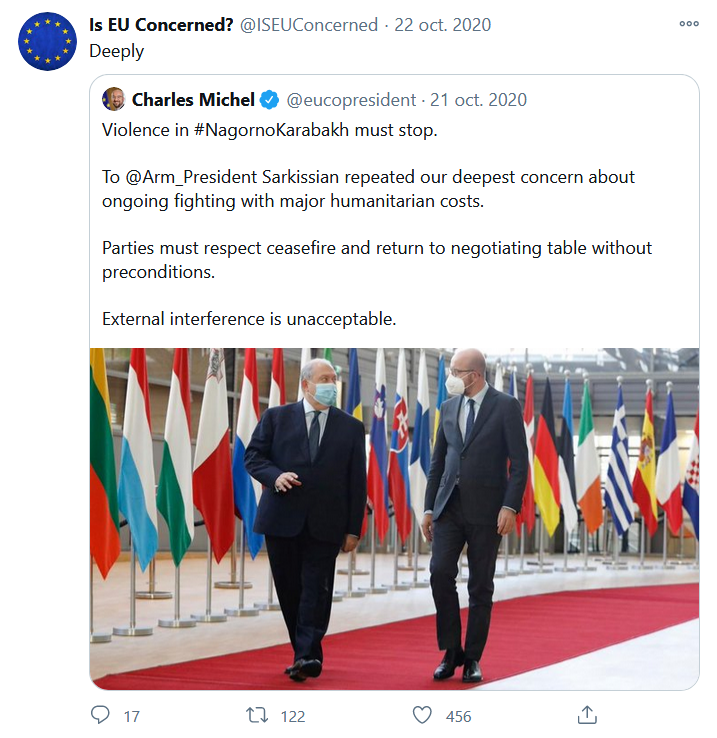January in the Caucasus: is the EU concerned?3 min read
January editorial. Surfing social media for updates about Nagorno-Karabakh continues to be a special form of torture. Ignorant arguments, blind faith and nationalism, and most of all, the depravity of some users makes the quest for information and well-reasoned opinions a struggle.
Occasionally, however, there are gems to be found, like this one:

Tweet on 21 October 2020 / @ISEUConcerned
@ISEUConcerned perfectly encapsulates the European response to the events surrounding the Second Nagorno-Karabakh War—only one of concern. The account only responds to tweets of European officials and diplomats on tragedies taking place around the world. On the violent suppression of democratic protests in Belarus, the account asks how concerned is the EU? Deeply. On the violations of gender equality in Poland? Very. The tweets function as a comment on the perceived inaction of the European Union to the world’s most pressing issues. Now that the war in Nagorno-Karabakh has ended, will the EU finally get involved or continue to only express its deepest concerns for peace in the region?
European presence was largely unfelt during the Second Nagorno-Karabakh War. The EU was distracted by a number of issues such as a deadly resurgence in the pandemic, the tumultuous US election, and the looming deal or no deal Brexit complications.
Despite European silence, unitary action was taken by French President Emmanuel Macron who regularly called for peace and facilitated dialogue with Russian President Vladimir Putin. Even so, regular diplomacy has never been particularly effective in the conflict over Karabakh. Macron was less likely to be involved for genuine humanitarian reasons but instead to put a stop to long-running regional bully Turkey, intent on creating trouble surrounding Europe in the Eastern Mediterranean, Iraq, Syria, and Libya.
The EU can no longer afford to sleep on the conflict between Armenia and Azerbaijan, as well as their avaricious sponsors. While the absence of European peace efforts and dialogue during the war was all too apparent, not all is lost—yet. European engagement, further than statements which only condemn violence, is warranted. Sanctions on Turkey for its role in providing weaponry and importing foreign militants to Azerbaijan would be a welcome start.
The 9 November ceasefire leaves many important questions unanswered such as the status of Nagorno-Karabakh, which has not yet been determined. Notably, the ceasefire is Russian-brokered and did not take European input. The EU must stand its ground and insist on a role in any further negotiations on Karabakh’s status.
The post-war security situation is unpredictable at best. This is another area where European leaders and policymakers could play a key role in establishing regionally-beneficial solutions and ensure that peace is sustainable. Russia should not remain the sole arbiter of the fate of Nagorno-Karabakh.
So will the EU be concerned? Probably not. As with past conflicts in Europe’s periphery, they won’t become pressing until they reach their shores. In the future, we can expect a further disjointed response from Europe in the Caucasus.



